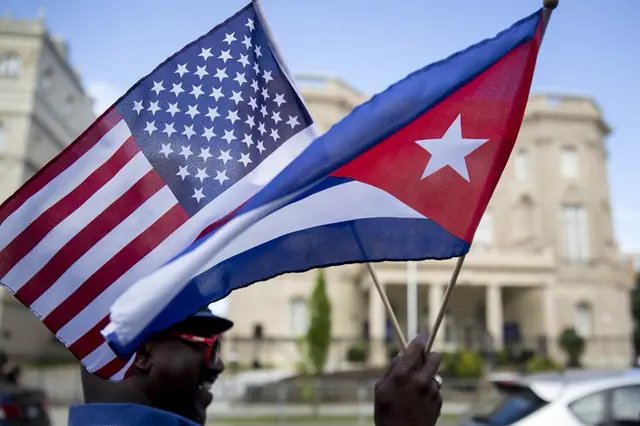Any shift in Washington's policy on its relations with Cuba would come to a dead end and have a direct impact on the progress made towards normalizing bilateral ties, a Cuban expert said Wednesday.
"Various areas of cooperation and scientific collaboration could be damaged by a rollback in current Cuba policy. U.S. companies' economic interest in investing in Cuba would also be limited," Esteban Morales, a professor at the University of Havana, told Xinhua.
Uncertainties reign in Cuba over a possible about-face in policy towards the island and the scope of these new measures which U.S. President Donald Trump is to announce Friday.
U.S. media have speculated the White House will try to roll back the thaw in diplomatic ties that was spearheaded by Trump's predecessor Barack Obama, especially as the announcement will be made in Miami, Florida, home to the largely anti-Castro Cuban exile community.
While no one expects Trump to sever recently restored diplomatic ties between the former Cold War foes, or re-close the U.S. embassy in Havana, his administration has been discussing policy changes that include barring business transactions with companies associated with the Cuban military.
The White House may also clamp down on travels to Cuba by U.S. citizens, which have more than tripled since Obama and Cuban President Raul Castro announced their agreement to normalize ties in 2014.
A return to the past could characterize Trump's announcement that fulfills a promise he made in his election campaign last year.
"The extremist Miami exile sectors are interested in returning to that old policy because those groups lived off that confrontation for more than 50 years and it was the American taxpayers who financed that failed policy," Morales said.
During a U.S. Senate hearing Tuesday, Secretary of State Rex Tillerson said Washington would continue trade and ties with Cuba only if the Cuban government meets U.S. demands in the area of human rights.
"Cuba is ready to negotiate with the United States on equal terms about human rights on the island, but the human rights situation in the United States must also be addressed at the negotiating table, because we also have concerns about that issue," said Morales.
On the economic and financial front, he believes that the White House is unlikely to set new limits on trade or investment since they would be very unpopular among U.S. business sectors that advocate for closer ties between the two economies.
Before the end of his term, Obama relaxed certain restrictions on Cuba.
U.S. tech giant Google installed servers in Cuba; international hotel operators rushed to open five-star hotels in Havana and Cuba's resorts; airlines eagerly launched regular commercial flights to different cities in the country; and cruise lines put Havana and Cuban resorts on their itineraries. Even Airbnb, an online accommodation booking behemoth, lets Americans arrange stays in private homes in Cuba.
"It would be very hard to reverse (the resumption of) commercial flights, cruise ships, U.S. visitors to Cuba and other businesses because major financial sectors would complain about such a move," Morales said.
While U.S. citizens are not free to vacation in Cuba, Obama did relax travel restrictions. In the first five months of this year, 284,565 U.S. citizens took advantage of that change in policy, which allows travel to Cuba for educational, religious or cultural purposes, among others.
The figure, reported Tuesday by Cuba's ambassador to Washington, Jose Ramon Cabanas, is equal to the total U.S. visitor arrivals in all of 2016.
"If Trump is interested in making it harder for Americans to come to Cuba through special permits or new categories, I think it's going to fail. It would be a measure that couldn't be sustained over time," Morales said.
In December 2014, in the most sweeping change in U.S.-Cuba relations in five decades, Obama and Raul Castro jointly announced plans to normalize ties, in a move that quickly sparked much controversy in the United States.
Since then, improvements have been made in U.S.-Cuba diplomatic and trade ties, and the island has experienced an international tourism "boom" receiving a record 4.1 million visitors in 2016.
A recent poll by U.S. travel agency Insight Cuba indicates that six out of 10 Americans plan to visit the island in the next two years, a figure that could increase U.S. visitors to almost 2 million annually.
"Trump might be able to implement a new policy towards Cuba, and if he does, he will most likely end up, like the other presidents who wanted to follow that path, with a total failure," said Morales.
(ASIA PACIFIC DAILY)
 简体中文
简体中文





